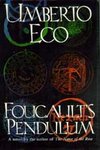Foucault's Pendulum - Umberto Eco
 Title: Foucault's Pendulum
Title: Foucault's Pendulum
Author: Umberto Eco
Country: Italy
Year: 1988
Pages: 641 pgs.
Rating: A
I believe Umberto Eco is the only author I have ever read that can fill a novel with intense intellectual thought, numerous complex theories and treatises, yet still have a well-developed plot and characterization. And, it's a page turner (although the pages do turn a little slower than other books).
I read this book with a dictionary and Internet connection nearby. Yet, I also treasured it's pulpy, film noirish elements (a pulp novel for intellectuals, perhaps?). "The stale, rancid smell of cigarette butts, the ashtrays all brimming. The kitchen sink piled high with dirty dishes, the garbage bin full of disemboweled cans...This was the apartment of a man who had worked nonstop for days without budging, eating only when he had to, working furiously, like an addict." How Eco manages to incorporate pop culture references (Mickey Mouse, Casablanca) into such a novel and make it work, is genius.
Mainly because I studied the theory extensively as a postgrad, I immediately recognized Eco's reliance on postmodernist theory to advance the narrative (post-modernism as the theory that there is no absolute truth; rather, truth is relative to the community we belong to, and to those that hold power). "Official history," the colonel said with a bitter smile, "is written by the victors. According to official history, men like me don't exist." (p.123) -and- "Or is the message really that we should look at everything in a different way" (p.13)
I am surprised this book was a bestseller, and I wonder if all those who bought the book ever got around to starting---and finishing, it. I for one had the book sit on my shelf for 4 years before I was brave enough to open it. And definitely, the first chapter or two are pretty hard to get into. But after that, it was a joy to be in the world of this scholarly detective novel.
Causabon's self-reflection:
"The other evening I had to believe the Plan was true, because if it wasn't, then I had spent the past two years as the omnipotent architect of an evil dream. Better reality than a dream: if something is real, then it's real and you're not to blame." (p.164)
"In those halcyon days I believed that the source of enigma was stupidity. Then the other evening in the periscope I decided that the most terrible enigmas are those that mask themselves as madness. But now I have come to believe that the whole world is an enigma, a harmless enigma that is made terrible by our own mad attempt to interpret it as though it had an underlying truth." (p.95)
Fun Piedmontese expression:
"Ma gavte la nata. Take out the cork." You say to to one who is full of himself, the idea being that what causes him to swell and strut is the pressure of a cork stuck in his behind. Remove it and psssssh, he returns to the human condition." (p.56)
Great Art vs. dime novels:
'Maybe only cheap fiction gives us the true measure of reality... Great Art makes fun of us as it comforts us, because it shows the world as the artists would like the world to be. The dime novel, however, pretends to joke, but then it shows us the world as it actually is - or at least the world as it will become... What has taken place in the real world was predicted in penny dreadfuls.'




